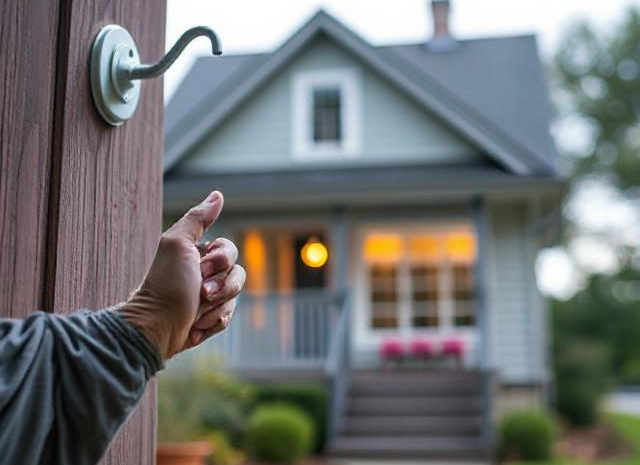
The Role Of Home Security In Reducing Insurance Costs
Home security plays a significant role in reducing your home insurance premiums. Insurance companies assess the risk of insuring your property, and having a robust security system in place can lower that risk, leading to potential savings on your premiums. Here’s how home security systems can directly impact your home insurance costs:
1. Lowering the Risk of Theft
One of the primary benefits of home security systems is their ability to deter burglars and reduce the likelihood of theft. Insurance companies consider the risk of property theft when calculating premiums, and homes with security systems are seen as less likely to experience break-ins.
- How it helps: Homes with alarm systems, surveillance cameras, and motion sensors are less attractive to burglars, making your home a lower risk for insurance providers.
- Impact on premiums: Insurance companies may offer discounts of 5% to 20% for homes with security systems, depending on the type and level of protection.
2. Protection Against Vandalism
Security systems don’t just protect against theft—they can also help prevent vandalism, which can cause costly damage to your property. For example, outdoor security cameras can discourage vandals from defacing your property or damaging vehicles parked outside.
- How it helps: Vandalism is often covered by homeowners insurance, but it can be costly to repair damages. Security measures like cameras, motion detectors, and outdoor lighting can help minimize this risk.
- Impact on premiums: Insurers may offer discounts for homes with security systems that reduce the likelihood of vandalism.
3. Fire and Smoke Detection
Many modern home security systems include fire and smoke detectors, which can alert you and emergency services to a fire or smoke-related issue in your home. Fast detection can prevent the spread of fire and reduce property damage.
- How it helps: Having smoke detectors and fire alarms connected to a security system lowers the risk of extensive damage due to fires. Insurance companies favor homes with integrated fire protection systems, as they reduce the potential for significant loss.
- Impact on premiums: Homes with fire and smoke detection systems may receive discounts on premiums due to the reduced risk of severe fire damage.
4. Water Leak Detection
Some advanced security systems also offer water leak detection, which can help identify leaks from pipes, faucets, or appliances before they result in significant water damage. Early detection can save your home from flooding or water-related disasters.
- How it helps: Water damage can be costly to repair, especially when it affects the foundation, walls, or expensive appliances like HVAC systems. Security systems with leak detectors can prevent these types of claims.
- Impact on premiums: Insurance providers may offer discounts or lower premiums for homes equipped with leak detection systems that reduce the likelihood of extensive water damage.
5. Smart Home Integration
Many security systems are part of a larger smart home setup, with features such as smart locks, remote surveillance, and even automated lighting. These systems provide convenience and additional security measures that can further reduce the risks associated with your home.
- How it helps: Smart technology allows homeowners to remotely monitor and control security features, even when they are away from home. This increased level of control reduces the likelihood of damage from theft, fire, or other hazards.
- Impact on premiums: Insurers may offer discounts for homes that are equipped with smart security systems, as they enhance overall protection and mitigate potential risks.
6. Monitoring Services
Having a home security system that includes professional monitoring can significantly lower your insurance premiums. Monitoring services typically involve 24/7 surveillance by trained professionals who can alert the authorities if something is wrong, such as a break-in or fire.
- How it helps: Homes with monitored security systems are less likely to experience long-lasting damage because professionals can quickly respond to threats.
- Impact on premiums: Homeowners with professionally monitored systems may receive discounts of up to 10% or more, as the presence of monitoring increases the likelihood of rapid response and minimizes the overall risk.
7. Increased Deterrence of Natural Disasters
Some advanced security systems also include features designed to protect against natural disasters, such as flood sensors or earthquake detectors. These can help mitigate damage from natural disasters by providing early warnings.
- How it helps: Early detection of natural disasters like floods or earthquakes can allow homeowners to take precautionary measures, such as evacuating or moving valuables, to reduce damage.
- Impact on premiums: While coverage for natural disasters is typically separate from regular home insurance, systems that help reduce the risk of damage from these events may lower the cost of coverage.
8. Peace of Mind and Fewer Claims
The presence of a comprehensive security system can prevent accidents and reduce the likelihood of filing claims. This is important because insurance companies often raise premiums after claims are filed. A home that’s less likely to experience an incident means fewer claims and a lower risk for the insurer.
- How it helps: A security system minimizes the chances of damage or theft, leading to fewer claims and potential increases in premium rates.
- Impact on premiums: Over time, homes with security systems may have fewer claims, resulting in lower rates and potential discounts for maintaining a claims-free history.

